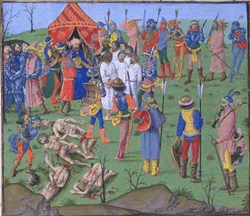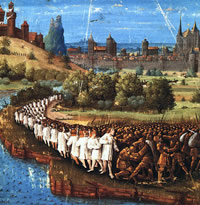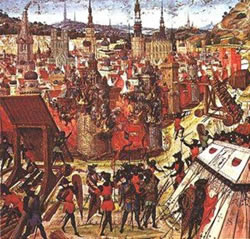"You Must Be On Your Guard:"
10 Warning Signs That Religion Has Become Evil
For Sunday November 15, 2009
Lectionary Readings (Revised Common Lectionary, Year B)
1 Samuel 1:4–20 or Daniel 12:1–3
1 Samuel 2:1–10 or Psalm 16
Hebrews 10:11–14 (15–18), 19–25
Mark 13:1–8
At the end of his thousand-page history of the Crusades called God's War (2006), Christopher Tyerman warns of the dangers of sentimentality and naiveté about religion: "It is a fond myth of the religious that piety excludes greed, coercion, conformity and lack of reflection, that it is freestanding. The language of transcendence should not distract or dupe."
Tyerman's book is about the Crusades, when genocide and forced conversions, butchery and baptisms, were all construed as works of God. The church not only justified and sanctified the Crusades, it even canonized them as meritorious deeds that earned one remission of sins and eternal salvation. Tyerman's warning is as applicable to today as it was to medieval Europe. Even in Jesus's own day and among his closest followers religion could turn toxic.
I thought about Tyerman's "fond myth" when I sent my daughter to college this fall and emailed a friend about churches she might visit; he responded with a few suggestions, then included a warning: "There is one church she should avoid. It is cultic, and its members work very hard to get unsuspecting college students to come. Then they love-bomb them and they become members, and then they distance themselves from their family and other believers. It is hard-core, legalistic, and authoritarian, but people get sucked in because the people are very hospitable. I went there for a long time growing up, and even today we get shunned by members for having left."
 |
Holy War. |
At least four times in the Gospel for this week Jesus warns his followers: "Watch out that no one deceives you. Many will come in my name, claiming, 'I am he,' and deceive many. . . . You must be on your guard" (Mark 13:5–6, 9, 23, 33). These "false prophets and false Christs" would, if possible, deceive even his most intimate associates, said Jesus (Mark 13:22). Examples of religion gone bad haunt the Gospels. Jesus's disciples jockeyed for greatness and glory. They wanted to exterminate a Samaritan village. They tried to prevent children from coming to Jesus, they objected to an anonymous healer who was not part of their inner circle, and in the garden of Gethsemane they defended him with the violence of the sword.
In the name of God's love Christians have slaughtered Muslims (the Crusades), Jews (the Holocaust), Native Americans (The Conquest of America by Tzvetan Todorov), and certainly each other (the Thirty Years War). We have humiliated and exploited slaves, women and gays. Here in America we've aligned the Gospel with nationalistic and political ideologies of both the conservative right (evangelicals) and the liberal left (mainline denominations), all in the name of Jesus.
Some critics vilify Christendom as the worst of all offenders, but I'd make two observations. First, religious violence knows no boundaries and plays no favorites, either with perpetrators or victims. Child sacrifice (eg, Aztecs sacrificed 20,000 people in four days at the consecration of a temple in Mexico in 1487), widow burning, caste systems, female genital mutilation, witch hunts, ritual abuse, ethnic cleansing, suicide bombers, apartheid, and mass suicides — the list is depressingly long. Second, atheism hardly gets a free pass. The exterminations of 100 million people in the last century have come in the name of "liberations" by Soviet and Maoist atheism.
 |
Crusade of 1096. |
Why people do evil in the name of religion, why we talk about love but torture and annihilate, might seem inexplicable. After studying the Crusades all his life, Tyerman concludes that it's an "irreconcilable paradox" why medieval crusaders who followed the Prince of Peace endured unimaginable personal risks and privations in order to slaughter fellow human beings with such sincerity. In his book The Most Dangerous Animal (2007), David Livingstone Smith argues that violence is more a function of biology than religion. He says that war is deeply embedded in human nature, that it's innate, and our natural impulse. As such, war is not a pathology or aberrant choice but "a normal feature of human life."
None of these "explanations" mean that we should ignore, excuse, or rationalize religious violence. Far from it. We should not remain silent when we see religious fraud. We should name it for what it is. We can all learn and reflect upon some of the signs that religion has become evil and that evil has become religious. Here are ten warning bells.
* Fanatical claims of absolute truth. I don't mean the belief in absolute truth(s), which I think is both tenable and admirable, but rather the doubt-free and uncritical confidence that one has understood absolute truth absolutely.
* Identifying the Gospel with nationalistic ideologies, partisan politics, state power, and ethnic identity.
* Blind obedience to totalitarian, charismatic, and authoritarian leaders, personality cults, or views that undermine moral integrity, personal freedom, individual responsibility, and intellectual inquiry.
* Ushering in the “end times” in the name of your religion. For a very painful illustration of these first four points, watch the film Jesus Camp.
* Justifying religious ends by dubious means.
* Any and all forms of dehumanization, from openly declaring war on your enemy, demonizing those who differ from you, construing your neighbor as an Other, to claiming that God is on your side alone. Do you believe that God loves Iraq and North Korea as much as America? There shouldn't be the slightest hesitation or qualification in the answer — He does.
* Pressure tactics of coercion, deception, and false advertisement.
* Alienation, isolation and withdrawal from family, friends and society, whether psychologically or literally (eg, David Koresh's Branch Davidians or Jim Jones' "People's Temple" in northern Guyana).
* Exploitation and all forms of unreasonable demands upon one's time, money, resources, family, friendships, sexuality, etc.
* Oddball, sectarian interpretations of Scripture that have little or no support from the broad, classical Christian tradition, or that disregard the best of historical-critical scholarship. The wildly successful Left Behind books (60 million copies sold) are a prime example of such Scripture-twisting.
Often these danger signs combine and overlap.
I recently read two disturbing memoirs about damage done in the name of religion. In An American Gospel; On Family, History, and the Kingdom of God (2009), Erik Reece describes the compulsory, fundamentalist faith that he inherited from his grandfather and father (both Baptist preachers). His father's suicide at the age of thirty-three had medical roots, he admits, but it was badly aggravated by the "acute self-loathing," "life-negating principles," "oppressive faith," and "repressive morality" of his fundamentalist heritage. When Reece himself experienced something like a nervous breakdown at the same age of thirty-three, he headed for a Buddhist monastery to purge himself of the demons of his family faith.
 |
Capture of Jerusalem, 1099. |
Veronica Chater's memoir, Waiting for the Apocalypse; A Memoir of Faith and Family (2009), centers around her father Lyle Arnold, for whom the modernizations of Vatican II were not fresh winds of change but "the smoke of Satan." He's spent his entire adult life in a self-styled "counter-revolution movement" to return the Catholic church to its original purity. His honorable intentions, dictatorial faith, religious earnestness and sheer stupidity all backfired. Only one of his eleven children remains a practicing Catholic; otherwise the entire family paid a steep price in bitterness, resentments, banishment, drugs, teenage sex, and school drop-outs. In the last pages of her book, the Arnold family of fifteen is living in a dilapidated three bedroom/one bathroom house. Hell had descended to earth in Arnold's kamikaze quest for heaven.
Don't be deceived or duped, said Jesus. Be on your guard against the many false faiths that masquerade as true religion.
For further reflection
* What experiences have you had with the ten warning signs above?
* Can you think of contemporary examples of these warning signs?
* See Mark Juergensmeyer, Terror in the Mind of God: The Global Rise of Religious Violence (Berkeley: University of California, 2000), which includes separate chapters on violence by Christians, Jews, Muslims, Sikhs, and Buddhists. And Charles Kimball, When Religion Becomes Evil (2002).
Image credits: (1) csc.apolyton.net; (2) crusades.boisestate.edu; and (3) answers.com.





